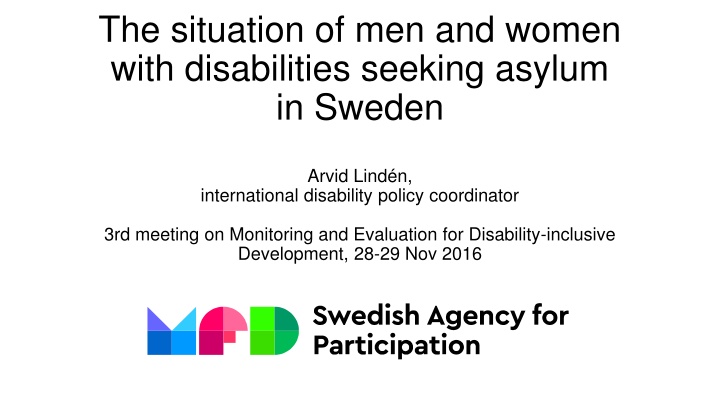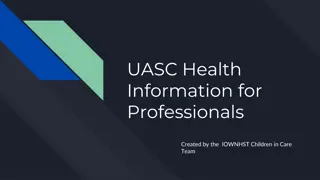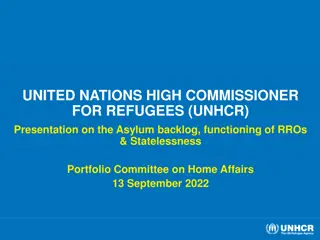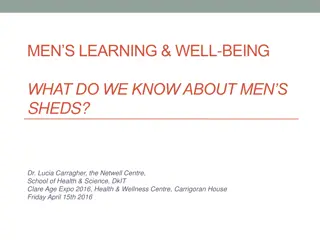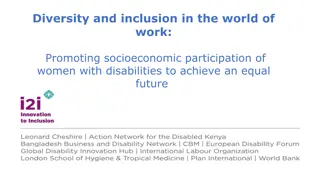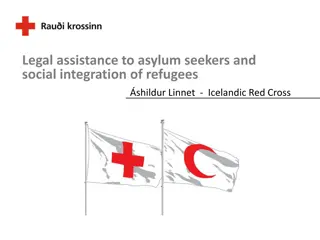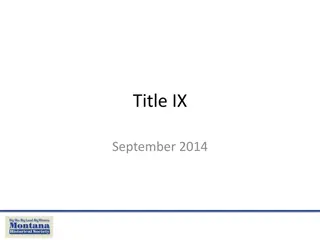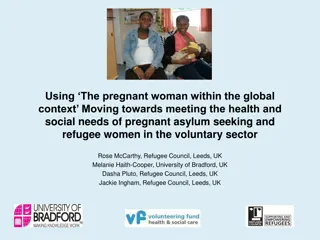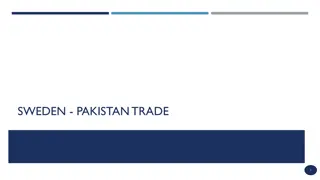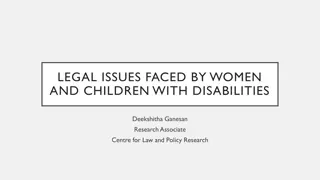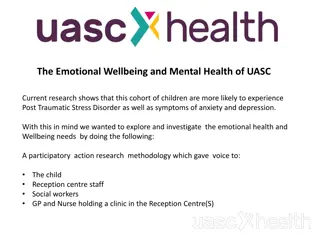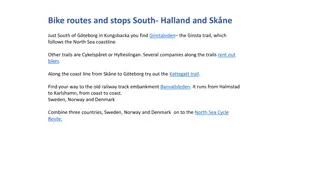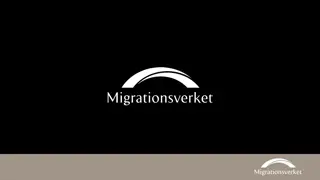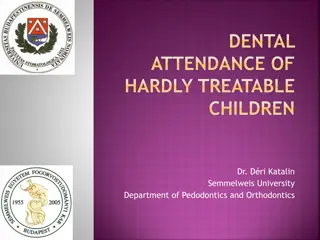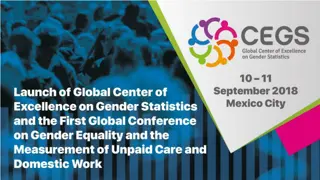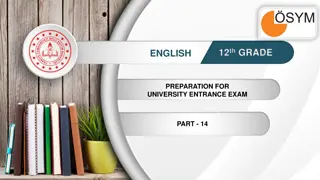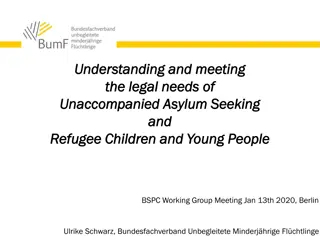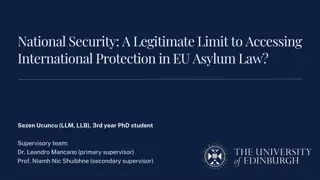Enhancing Support for Men and Women with Disabilities Seeking Asylum in Sweden
The Agency for Participation in Sweden focuses on promoting equality and participation for persons with disabilities, including those seeking asylum. They work towards implementing Agenda 2030 goals in national and international disability policies, with a specific emphasis on addressing poverty, health, education, gender equality, and more. The study outlined aims to provide data for improving conditions and the asylum process for individuals with disabilities seeking refuge in Sweden, ensuring inclusivity and support.
Uploaded on Sep 29, 2024 | 0 Views
Download Presentation

Please find below an Image/Link to download the presentation.
The content on the website is provided AS IS for your information and personal use only. It may not be sold, licensed, or shared on other websites without obtaining consent from the author.If you encounter any issues during the download, it is possible that the publisher has removed the file from their server.
You are allowed to download the files provided on this website for personal or commercial use, subject to the condition that they are used lawfully. All files are the property of their respective owners.
The content on the website is provided AS IS for your information and personal use only. It may not be sold, licensed, or shared on other websites without obtaining consent from the author.
E N D
Presentation Transcript
The situation of men and women with disabilities seeking asylum in Sweden Arvid Lind n, international disability policy coordinator 3rd meeting on Monitoring and Evaluation for Disability-inclusive Development, 28-29 Nov 2016
Outline The Agency for Participation Current work on Agenda 2030 National International A study on the situation of men and women with disabilities seeking asylum in Sweden
The Agency for Participation Established to take a more comprehensive, cross-sectoral approach with the task to stimulate and develop knowledge building in the area of rigths of persons with disability participation, accessibility universal design digital technology living conditions and environment Mission: to accelerate the progress towards a society in which everyone can participate on equal terms, regardless of functional capacity
Agenda 2030 in national disability policy 1 No powerty 3 Good Health and Well-being 4 Quality Education 5 Gender Equality 8 Decent Work and Economic Growth 10 Reduced Inequalities 11 Sustainable Cities and Communities 16 Peace, Justice and Strong Institutions 17 Partnerships for the Goals
Agenda 2030 in Swedish international policy frame-work The disability perspective needs to be included Special attention for PWD in gender analysis PWD as a priority group for global partnership The knowledge and experiences of the civil society should be utilized Sweden should take an active part internationally in the development of methods for monitoring the implementation of Agenda 2030.
Objectives of the study To provide data for more in-depth studies and efforts to improve conditions for people with disabilities seeking asylum in Sweden To provide a basis for improvement of the asylum process so that they are universally designed applicable to everyone with additional support available as needed.
Knowledge gathering Reference group meetings Survey
Asylum applications (non-EU) 200515 in the EU-28 Member States 1,400 1,200 1,000 thousands 800 600 400 200 0 2005 2006 2007 2008 2009 2010 2011 2012 2013 2014 2015 Source: Eurostat
Main citizenships of (non-EU) asylum applicants, Sweden 2015 160 000 asylum applicants to Sweden in 2015 Other Eritrea Stateless Iraq Afghanistan Syria 0 10,000 20,000 30,000 40,000 50,000 60,000 Serie 1 Source: Eurostat
Distribution by age of (non-EU) first time asylum applicants in Sweden and the EU, 2015 65 and over 35 64 18 34 14 17 0 13 0.0 10.0 20.0 30.0 40.0 50.0 60.0 Sweden EU-28 Source: Eurostat
Distribution by level of education (non-EU) first time asylum applicants in Sweden, 2015 Post-secondary two years or longer. Post-secondary shorter than two years. Secondary school Secondary (primary) 9 (10) years. Secondary (primary) less than 9 years 0.0 5.0 10.0 15.0 20.0 25.0 30.0 35.0 Source: Swedish employment service
Consequences of the refugee crisis Longer processing time for a residence permit Several alternative arrival accommodations for asylum seekers were established There is a general lack of knowledge among and between actors - Routines missing many times on the basis of the changed starting position and responsibility.
Problems identified due to the refugee crisis Inadequate introduction meetings for children Lack of interpreters Lack of custodians/contact persons for unaccompanied children Insufficient health control routines Insufficient training for staff working in arrival accommodations
Persons with disabilities in the Swedish asylum seekers process the population psychological health problems dominate the current discourse Post Traumatic Stress Disorder (PTSD), Depression, Trauma - Second wave Every third asylum seekers are estimated to suffer from mental illness Culture creates differences in the symptoms - Incorrect treatment Migrants and refugees often have a higher incidence of mental illness, but turns less to psychiatric care
Persons with disabilities in the Swedish asylum and refugee process Population comprised of persons with many different impairments, including physical impairment, visual impairment, hearing impairment, dyslexia and intellectual impairment (which may not be noticeable until later in the process, eg, in education and employment) Several studies show that hearing impairment is common among refugees from war-torn countries
Persons with disabilities in the Swedish process The authorities indicate that there is lack of knowledge and statistics about the group concerned Studies in this area are often short-sighted and lack quality Women are believed to be at a higher risk than men as asylum seekers (National Board of Health and Welfare)
The lack of statistics and qualitative data Reports on people with disabilities in the asylum process indicate that the group is particularly vulnerable There is very little documented about disability in connection with the asylum process, the statistics available are often inadequate or non-existent A general lack of gender-based and typ of disability statistics The mapping and statistics available concern primarily psychological health problems and often linked to the health controls carried out by the county councils
Thank you Arvid Lind n arvid.linden@mfd.se +46 76 104 1525
